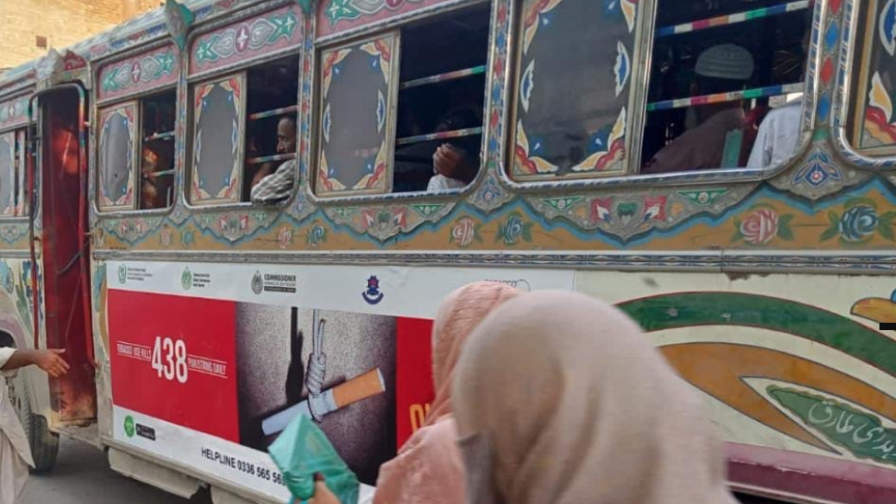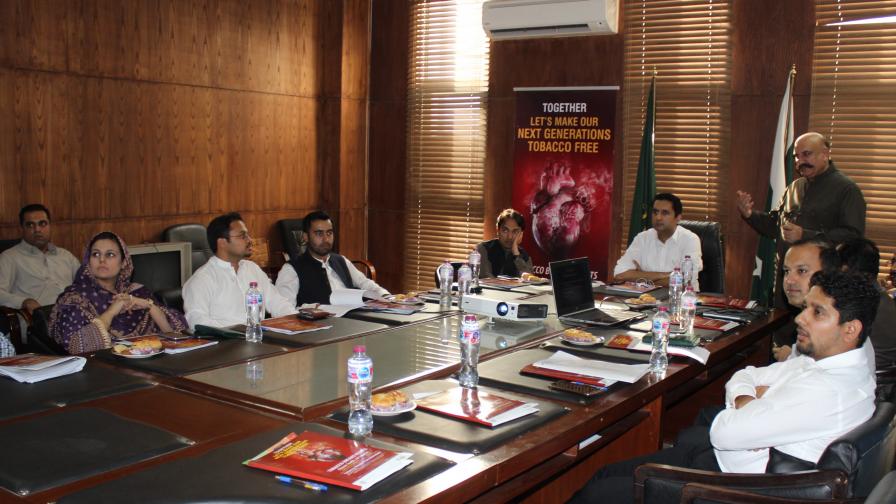Background Summary

Tobacco related diseases kill more than 160,000 people in Pakistan every year(1).
Smoking prevalence is high, with 20.3% of adults using tobacco products daily2. Pakistan also faces the challenge of high smoking prevalence among youths (10-14 years old). 10.7% of the youth population smoke in Pakistan and two in five smokers report that they initiated smoking before the age of 10(2,3).
The total economic costs of smoking in Pakistan, including direct costs related to health care expenditures, the costs treating tobacco-related disease, and indirect costs, is over 143 billion rupees (891 million USD) annually(1).
Policies In Focus
In 2002, Pakistan ratified the national tobacco control law “Prohibition of Smoking and Protection of Non-Smokers Health Ordinance 2002” under which all public places are mandated to be 100% smoke-free.
Two years later, in 2004, Pakistan ratified the Framework Convention on Tobacco Control (FCTC) and has continued to pass tobacco control policies in subsequent years. In 2015, the Tobacco Vendors Act (TVA, 1958) was re-enacted in Islamabad and licensing fees for tobacco vendors were revised. Under the TVA licenses are issued to tobacco vendors, including traders and sellers, for a nominal annual fee. Despite progress in policy making in Pakistan, enforcement of tobacco control laws remains a challenge.
ACHIEVEMENTS In Pakistan

In 2008, The International Union Against Tuberculosis and Lung Disease (The Union) began working in Pakistan to support tobacco control efforts by providing technical assistance to the government.
In 2015, The Union supported the Islamabad municipal government to initiate the Tobacco-Smoke Free Capital project, following a compliance assessment showing smoke-free violations across all public places and public transport. This data was used to convince policy makers and enforcement agencies of the need for a greater emphasis on enforcement and a concerted effort was launched to improve smoke-free compliance. Interventions included training of 2,500 officers, 140 raids over two years, public inauguration of 124 public places as “Tobacco Smoke Free”, improved monitoring and inspection protocols and establishing a coordination mechanism. A post intervention survey in September 2016 showed that the target of 80% compliance across all venues had been met.
After the success of the Islamabad project, the model was expanded into five districts of Punjab province.
In April 2018, a baseline survey was conducted in these five districts and showed poor compliance with the law. This data was again used to convince policymakers and enforcement agencies of the need to improve enforcement of the law. The evidence helped mobilize all stakeholders and, after a short 6-month intervention, smoking in public places improved from an average of 41% compliance to 72%. There was also success in improving compliance with the prohibition on tobacco advertisement, promotion and sponsorship (TAPS) at point-of-sale (POS), with four of the five districts achieving over 90% compliance (from an average 55% baseline) and mobile application has was launched in the five districts for reporting violations, called “Smoke Free Pakistan”.
In 2015, the Tobacco-Smoke Free Capital (TSFC) Project started implementation of the Tobacco Vend Act (TVA).Thus far, 1300 out of 1700 tobacco vendors have been licensed and signed an affidavit to support public health and tobacco control efforts.
The fee and the affidavit caused many small vendors to stop carrying tobacco products entirely and provided an opportunity to confiscate illicit cigarettes. Additionally, 50% of the fee collected is used as a source of revenue for the continuation of enforcement efforts in the capital and is estimated to be 40,000 USD in revenue annually.
Smokefree Karachi
In 2020, The Global Implementation Program launched with The Union, aiming to replicate the success of the Tobacco Smoke-Free Initiative in Karachi, Pakistan’s largest city. In 2023, the program in Pakistan transitioned to Vital Strategies Tobacco Control Division and now supports all districts in Karachi.
The program provides technical support for smokefree policy implementation and engages district authorities to create ownership over the project in an effort to build sustainable enforcement mechanisms. A task force was assembled and focal persons for enforcing authorities have also been identified to ensure smooth implementation. Public awareness efforts have also been carried out, including posting information boards and stickers to hospitality venues, public transit and office buildings.
An external study carried out by Johns Hopkins University in 2018 in Karachi demonstrated a need for improved compliance.
See the results here:
Compliance with Smoke-free Public Places, East and South Districts of Karachi, Pakistan, 2019
This study from Karachi, Pakistan, assessed compliance with smokefree in different settings from October to November 2019.
Compliance with Smoke-free Public Service Vehicles, East and South Districts of Karachi, Pakistan, 2019
The objective of this study was to assess smoke-free compliance in public service vehicles in Karachi.
Explore Other Country Hubs:
中国控烟法律实施
subtitle: China Implementation
访问中国控烟法律实施中心
Find out more about implementing tobacco control policies in China.
India Implementation
Find out more about implementing tobacco control legislation in India.
Indonesia Implementation
Find out more about implementing tobacco control policies in Indonesia.
Sources
1) Pakistan. (n.d.). Retrieved December 03, 2020, from https://tobaccoatlas.org/country/pakistan/
2) W. (n.d.). WHO Report on the Global Tobacco Epidemic, 2019 Country Profile Pakistan (Rep.). World Health Organization.
3) Tobacco use kills 160,189 Pakistanis every year: SAMAA. (2019, April 25). Retrieved December 03, 2020, from https://www.samaa.tv/living/health/2019/04/tobacco-use-kills-160189-pakistanis-every-year/


